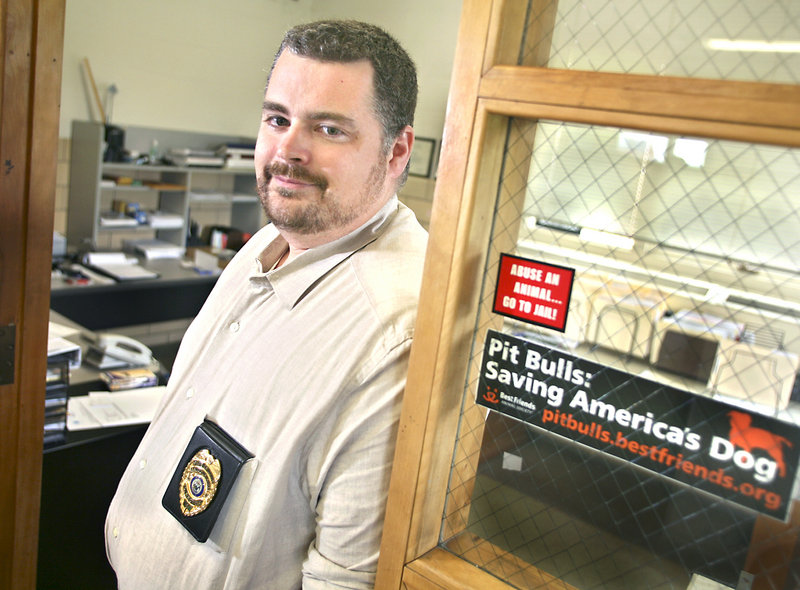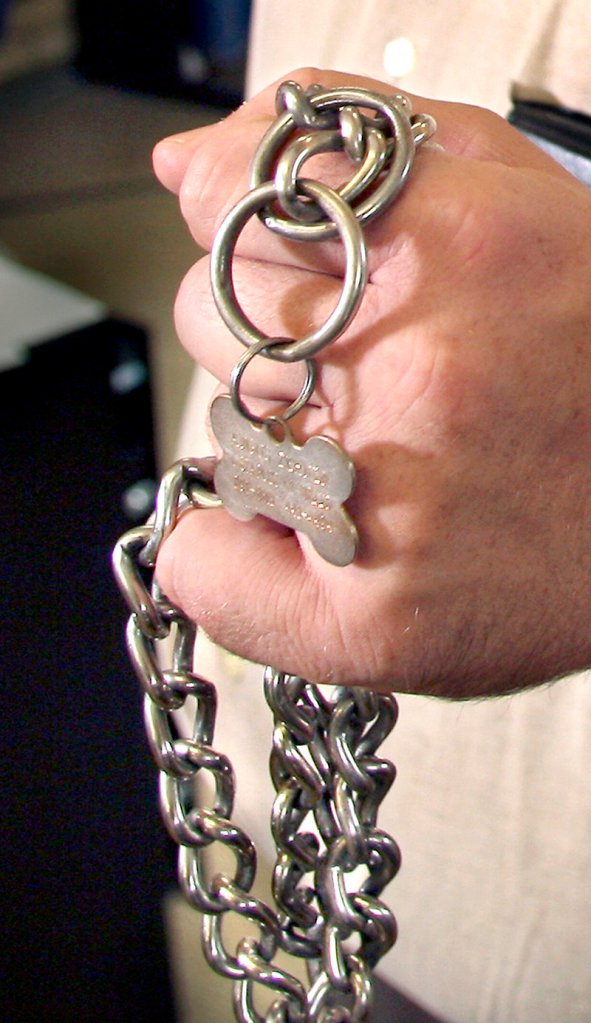AUGUSTA – The new man in charge of the state’s Animal Welfare Program is a carnivore and says he doesn’t have an opinion on whether animals have rights.
But Liam Hughes said he believes in balance when it comes to the human-animal relationship.
“As a society we are judged by how we treat our animals, so if we are treating our animals right, we are treating our neighbors right,” said Hughes.
Fresh from the Washington, D.C., Humane Society, Hughes started work Tuesday in Maine.
In Washington, he oversaw the private society’s animal control field services, with seven animal control officers responding to 16,000 calls per year. The calls mainly involved domestic dogs and cats but also included the wild animals that live in Washington’s parks.
In Maine, Hughes will be overseeing a $1.3 million annual budget and an eight-person department. Its task is to ensure that animals are humanely and properly treated while upholding the state’s animal welfare laws through communication, education and enforcement.
Those in the animal welfare field say the job demands an unusual combination of diplomacy and legal and animal rescue skills.
“No matter what you do, it seems someone is upset with you,” said Katie Lisnik, Maine state director of the Humane Society of the United States.
Maine is the only New England state with a state-run program dedicated to animal welfare. Most states depend on a network of privately run agencies, including national groups such as the Humane Society and local animal shelters, which all depend on private donations.
In Maine, the Animal Welfare Program falls under the Department of Agriculture. The program is funded from licensing fees for dogs, kennels, pet stores, shelters and research facilities, and pet and livestock food registration. Its budget has ranged from $1 million to $1.9 million a year — this year the budget is $1.2 million.
While the program is dedicated to investigating animal cruelty, abuse and neglect cases, it also licenses more than 400 kennels, animal shelters, pet shops and research facilities.
It works with municipalities to license dogs and runs a spay/neuter program for low-income pet owners.
It provides basic training for animal control officers and certification to municipalities, which are required to provide animal control services, either individually, or shared with other towns. There are about 250 municipal programs in the state.
Maine also has some of the toughest animal protection laws in the nation. Maine consistently ranks in the top five states with the strictest laws in the Animal Legal Defense Fund’s annual rankings. This year only Illinois was rated higher.
The Animal Welfare Program was established a decade ago after a smaller, earlier version came under fire when a commission found the program had been the subject of a number of complaints. A new director and veterinarian were hired and better training was provided for investigators.
The 12-member volunteer Animal Welfare Advisory Council was created to work with the agriculture commissioner on animal welfare matters, such as treatment of pets and horses.
Hughes is replacing Norma Worley, who stepped down in January after nearly a decade in the job.
Hughes, 40, grew up outside of Newark, N.J., the son of a police officer who sometimes filled in for the animal control officers. Hughes was enrolled in the CVS pharmacy manager’s program and volunteering at a local animal shelter when he realized he was on the wrong career path.
At the urging of friends, he became certified as an animal control officer, providing services to four New Jersey towns in two counties. He went on to become an animal cruelty investigator and shelter manager at several New Jersey organizations and worked as an animal care supervisor in Cheyenne, Wyo.
His opinions about animal welfare are always evolving, he said.
“I am not a particular fan of circuses, of research (involving animals) for no reason,” said Hughes.
In all his time working with animals, he has been bitten only twice — by a malamute and a kitten. Having been bitten so rarely is a point of pride, he said — it means he’s usually taking appropriate action and the two bites were anomalies.
“I wasn’t paying attention to what the animals were communicating,” said Hughes.
On day three at this job, his office was already decorated with a half-dozen certificates of his training and animal welfare- related bumper stickers.
Above his desk hang the collar and license of an abused dog. Charges against the owner were thrown out in court due to incomplete records, an example of how difficult it can be to prosecute animal abuse cases, Hughes said.
“That animal deserved justice. I have learned from that experience,” said Hughes.
Hughes has moved into a rented farmhouse in the Augusta suburbs with Blazer, his adopted 8-year-old pit bull-boxer mix.
Hughes said he intends to make improvements in the Maine program, but to do so within the shoestring budget mentality he developed working for private agencies.
“One of the reasons I am here is to find out how to improve and not cost thousands of dollars,” he said.
Some in Maine’s animal welfare community said they are looking for improvements, among them better enforcement of Maine’s existing laws.
Meris Bickford, chief executive officer of the Maine State Society for the Protection of Animals, New England’s largest horse shelter, said the society receives calls daily about possible horse neglect and abuse.
“The structure is there but it is not affirmatively engaged,” said Bickford.
Staff Writer Beth Quimby can be contacted at 791-6363 or at:
bquimby@pressherald.com
Send questions/comments to the editors.





Success. Please wait for the page to reload. If the page does not reload within 5 seconds, please refresh the page.
Enter your email and password to access comments.
Hi, to comment on stories you must . This profile is in addition to your subscription and website login.
Already have a commenting profile? .
Invalid username/password.
Please check your email to confirm and complete your registration.
Only subscribers are eligible to post comments. Please subscribe or login first for digital access. Here’s why.
Use the form below to reset your password. When you've submitted your account email, we will send an email with a reset code.